Keresés: %s
Keresés: %s
COVID-19
Please find below the all-state list of telephone numbers of the coronavirus health service providers:
Phone Numbers for State and Local Health Departments
Information on coronavirus
On the following links, you will find all useful and important COVID-19 pandemic related information:
- Information on entering and leaving Hungary (in effect from July 15):
https://www.bud.hu/en/covid_19/information_on_entering_and_leaving_hungary
- COVID-19 information for passengers arriving at Liszt Ferenc International Airport:
https://www.bud.hu/en/covid_19
- Important information about the coronavirus situation in Hungary:
https://washington.mfa.gov.hu/eng/news/fontos-informaciok-a-koronavirus-helyzetrol-magyarorszagon
- All-state list of telephone numbers of the coronavirus health service providers:
https://washington.mfa.gov.hu/eng/page/covid-19-eng
- Announcement of the Ministry of Foreign Affairs and Trade of Hungary related to certain unidentified persons are taking advantage of the situation generated by the SARS-CoV-2 (COVID19) global pandemic with the intention to commit fraud:
https://washington.mfa.gov.hu/eng/news/a-kulgazdasagi-es-kulugyminiszterium-bejelentese
- Coronavirus Update: PM Orbán announces new measures to beat the virus:
https://washington.mfa.gov.hu/eng/news/coronavirus-update-pm-orban-announces-new-measures-to-beat-the-virus
- Coronavirus: How Can Hungarians Stranded Abroad Return Home?
https://washington.mfa.gov.hu/eng/news/szijjarto-peter-kuelgazdasagi-es-kueluegyminiszter-koezlemenye-a-hazaterni-szandekozoknak
Hungary remains committed to the success of the Three Seas Initiative
Hungary has recently decided to join the Three Seas Initiative (3SI) Investment Fund, and offered to host the 3SI permanent Secretariat in Budapest. Hungary, together with the U.S. Administration and Congress strongly supports the 12 member strong regional initiative that aims to increase connectivity, security and further economic growth in the region. As the Initiative enters into its operative phase with the first project grants to be awarded, Hungary looks forward with working all stakeholders, including the United States, to make the project a transatlantic success story.
Hungary remains committed to the success of the Three Seas Initiative
June 3, 2020 11:11 AM
The Hungarian Government has decided to join the Three Seas Initiative Investment Fund with 20 MEURs, thus becoming the third Member of the Fund. The Hungarian Export-Import Bank’s aim is to finalize its accession before the TSI Ministerial Conference in June.
Hungary is an active Member of the Three Seas Initiative (TSI) since its conception, supporting its objective of investing in joint energy, infrastructure and IT projects that increase connectivity, security and further economic growth in the Central European region.
Hungary also proposes that the TSI establishes its permanent secretariat in Budapest. Launching an international secretariat will increase the visibility and capacities of the Initiative and enhance continuity, coordination and information sharing among stakeholders.
The next 3SI Summit in Tallinn in October can become one of the first examples of transatlantic economic cooperation involving States, international financial institutions, third party investors and the business sector in the post-COVID era, thus also contributing to economic recovery in the TSI region.
CONGRESSIONAL RECORD: REMEMBERING THE 100TH ANNIVERSARY OF THE TREATY OF TRIANON WITH HUNGARY
CONGRESSIONAL RECORD
Thursday, June 4, 2020
REMEMBERING THE 100TH ANNIVERSARY OF THE TREATY OF TRIANON WITH HUNGARY
THE HONORABLE ANDY HARRIS OF MARYLAND IN THE HOUSE OF REPRESENTATIVES
Mr. HARRIS. Madam Speaker, as Co-Chair of the Congressional Hungarian-American Caucus, I rise today on the occasion of the 100th Anniversary of the Treaty of Trianon with Hungary signed on June 4, 1920, at the Paris Peace Conference at the end of the First World War.
The non-negotiable treaty cost Hungary over 70 percent of her territory and one-third or three million of her indigenous ethnic-Hungarian population. For the last one hundred years, these ethnic Hungarian minorities have had to live in neighboring countries, with their cultural and political lives suffering at times. The Hungarian-American Caucus is a bipartisan group of distinguished House members, which seeks to represent the interests of Hungarian American constituents; foster bilateral relations between Hungary, a strong NATO ally, and the United States; and protect the rights of Hungarian minorities in Europe.
To that end, I include in the RECORD the following statement by the American Hungarian Federation, the oldest American Hungarian association in the United States, founded in 1906 in Cleveland, Ohio, and based in Washington, D.C., on the occasion of this 100th Anniversary of the Treaty of Trianon.
AMERICAN HUNGARIAN FOUNDATION
Akos L. Nagy, President of American Hungarian Federation.
Paul Kamenar, Chair, Executive Committee.
Frank Koszorus, Jr., Chair, International Relations Committee.
THE TREATY OF TRIANON: A HUNGARIAN TRAGEDY
‘‘Ancient poets and theologians could not imagine such suffering, which Trianon brought to the innocent. In their eyes, that was for the damned in Hell.’’—Sir Winston Churchill
One hundred years ago, June 4, 1920, the Hungarian delegation to the Paris Peace Conference was forced to sign the punishing Treaty of Trianon, arguably the most severe of all the post-World War I settlements concluded at the conference. Led by the Big Four—the United States, Great Britain,
France and Italy—those treaties were collectively designed to conclude the First World War and make the ‘‘world safe for democracy,’’ according to President Woodrow Wilson.
The ‘‘peacemakers’’ instead concocted a hazardous brew. The ostensible ‘‘peace’’ turned out to be only an armistice as World War II erupted merely 20 years later. Tens of millions of civilians and members of the military died in that war; the Holocaust devastated the European Jewish community; a
murderous Stalin occupied Central and Eastern Europe; and the world was thrust into a costly and dangerous Cold War.
Supposedly in the name of national self-determination, Trianon dismembered the thousand-year-old Kingdom of Hungary, a self-contained, geographically and economically coherent and durable formation in the Carpathian Basin, boasting the longest lasting historical borders in Europe.
The resulting non-negotiable treaty cost Hungary over 70 percent of her territory and one-third or three million of her indigenous ethnic-Hungarian population. Add to this the loss of all her seaports and up to 90 percent of her vast natural resources, industry, railways, and other infrastructure.
Millions of Hungarians woke up one morning and saw borders arbitrarily redrawn around them without plebiscites, ignoring Wilson’s lofty goal of national self-determination. The ‘‘absurd’’ treaty, as Wilson later referred to it, was never ratified by the United States; ignored a millennia of nation
building and age-old cultural affiliations; created new and enlarged countries; and produced millions of new minorities who today struggle for survival of their ethnic identity.
To this very day, Hungarian minorities have been subjected to discrimination, intolerance and violence. Schools in the successor states limit students from studying in their native Hungarian language; Hungarian church properties have been confiscated; and cemeteries and cultural monuments have
been vandalized. The ‘‘peacemakers’’ did insist that the new successor states, Romania, Yugoslavia and Czechoslovakia, sign various international instruments that included provisions for the protection of minorities. But those promises are largely unkept.
Despite these promises and the fact that Romania obtained Transylvania from Hungary under Trianon—more territory than remained as Hungary—Romania continues to ignore its obligations. Just recently in April, Romania’s president incited animosity against its ethnic Hungarians by making inflammatory statements resulting in tensions between Hungary and Romania, two NATO allies. The Hungarian historical communities in Romania, particularly the Szeklers, are denied a range of rights that threatens their very cultural existence.
Hungarians in Serbia, Slovakia, Romania, and Ukraine have all requested semi-autonomy by peaceful and democratic means. Such local governance would ensure democracy to beleaguered Hungarians, fulfill promises made to them one hundred years ago, and strengthen the democratic process by
serving as a model of how majorities and minorities can work together to redress past wrongs.
Considering the far-reaching implications of discrimination, intolerance, and animosity directed at the Hungarian minorities, the response from the European Union and the United States to date has been tepid. Stronger measures must be taken to remedy the ongoing abuses of minority rights that contravene numerous European Commission standards.
Together, the European Union and United States must ensure that democratic principles and international norms and practices relating to national minorities will finally prevail in Central and Eastern Europe and bring regional tension to a just and lasting end, all of which is in the strategic interests
of the United States and the American people. Only then will the Tragedy of Trianon be addressed.
Click here to read the floor speech of the Honorable Andy Harris of Maryland
Another energy diversification milestone reached by Hungary
Hungarian Gas Trade Ltd, a subsidiary of state-owned MVM Hungarian Electricity Ltd. (MVM Zrt.) has successfully booked LNG capacity from the Krk LNG Terminal in Croatia. The contract is for 1 billion cubic meters (bcm) annually, over a period of almost seven years. Together with the booking of another Hungarian-owned company, MET (overall 1.3 bcm for the next three years), Hungary has become the principal user of LNG capacity at Krk. The Hungarian contracts ensure the long term economic viability of the Krk LNG terminal that is due to start its operation on January 1, 2021, becoming the first operational LNG terminal in Central and Southeast Europe.
Hungary, for the first time, is to buy gas from a dedicated LNG source, using a new delivery route and ensuring long term source diversification. The contracts cover roughly a fifth of Hungary’s energy import needs. These developments are in line with the U.S. energy strategy aimed at assisting European energy independence through supporting connectivity and providing alternative sources.
Hungary – U.S. dialogue on Energy Security and Connectivity Issues
The Embassy of Hungary organized its first in-person VIP event since the breakout of the COVID-19 pandemic on July 1, 2020, on energy security. The event organized by Ms. Dóra Zombori, Hungarian Chargé d’Affaires at the Hungarian Ambassador’s Residence, was attended by A/S Philip Reeker, DoS; DAS Matt Palmer, DoS; DAS Matt Boyse, DoS; DAS Kurt Donnelly, DoS; DAS Andrea Lockwood, DoE; Director Ricky Gill, NSC; Dr. Jay Carafano, The Heritage Foundation. From Budapest, Energy Commissioner Pál Ságvári and Political Director István Balogh joined via VTC from the Hungarian Ministry of Foreign Affairs and Trade.
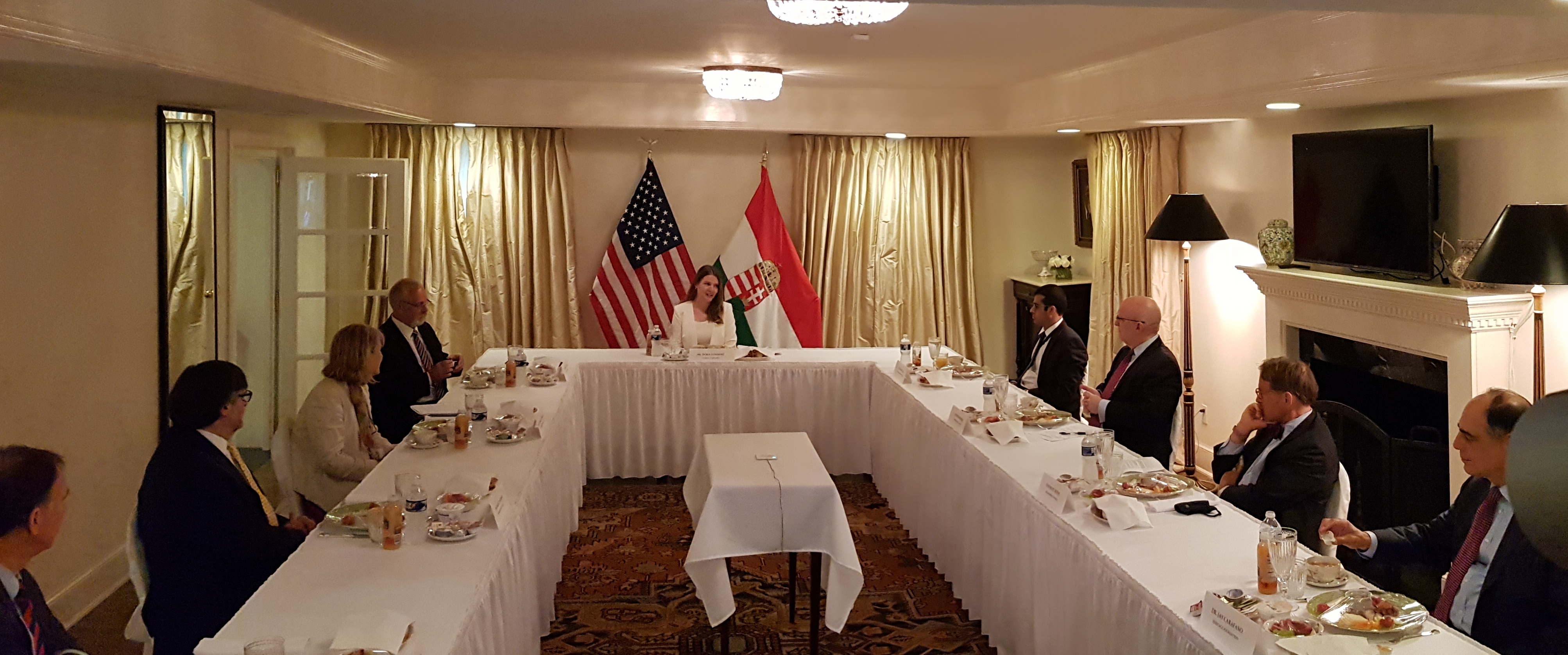
The event covered Hungary’s recent steps to ensure energy independence, such as booking the majority of the available capacity in the first 10 years of the Krk LNG Terminal. The discussion focused on the measures needed for more synergy between the European efforts and their American counterparts. Topics covered U.S. and Hungarian energy policy goals; DoE’s P-TEC project, where Hungary co-chairs the Energy Efficiency Working Group; private and public investment in the region, and the need for continued U.S. presence in regional energy diversification efforts, such as the Neptun project. The participants reaffirmed their joint support for the Three Seas Initiative (3SI) and their investment decision in the 3SI Investment Fund, following the successful virtual Ministerial Conference on June 30. The United States, through the U.S. International Development Finance Corporation, has committed to investing up to $1 billion toward 3SI energy projects, and welcomed the investments to the Fund announced by Hungary and other Member States.

Prime Minister Orbán Marks Independence Day in Letter to President Trump
Prime Minister Viktor Orbán greeted US President Donald Trump on the occasion of America’s Independence Day, on Saturday, the prime minister’s press office reported.
Hungarians and Americans are committed to values shared by their countries, such as freedom, sovereignty, and independence, the prime minister wrote in his letter. Efforts to preserve a Christian identity, supporting families, and providing joint assistance to Israel are dominant factors in the policies of both countries, he added.
Orbán highlighted the US’s sheltering many Hungarians that had to flee their homeland, and said that Hungarian-Americans are a strong link between the two nations. He said his government was committed to protecting freedom and sovereignty even in hard times, adding that Hungary was ready to make a fair contribution to NATO’s expenses.
Orbán also assured Trump that the Hungarian government would go on working to protect Hungary’s borders and fight illegal migration.
The Hungarian government wants to strengthen bilateral ties and stay a committed ally of the US, Orbán said, adding that he was looking forward to continuing in joint efforts.
featured photo: Szilárd Koszticsák/MTI
source: Hungary Today
Hungary concludes historic LNG purchasing agreement with Shell
A six-year purchase contract was concluded on September 4, 2020 with Shell for 250 million cubic metres of natural gas annually, between 2021 and 2027. This is the first long-term liquid natural gas (LNG) purchase agreement with a Western energy company in Hungary’s history. The contract with Shell has been concluded at such a competitive price that will enable the protection of the results and achievements of Hungary’s state-ordered public utility charge cut.
Earlier MVM Hungarian Electricity Works Zrt.’s natural gas trading company has tied down an annual capacity of one billion cubic metres for the period of 2021 to 2027 at the LNG terminal in Krk, Croatia. Accordingly, all requirements for the marketing of LNG from the Krk terminal have been met. Starting from next year ten percent of Hungary’s natural gas requirements will arrive through the Krk LNG terminal.
Natural gas plays the most important role in Hungary’s energy supply, and Hungary has decided increase the role of LNG in it. Due to the interconnectors that Hungary constructed, the natural gas networks of six out of seven of the country’s neighbours are now connected to that of Hungary. Dependable relations have been developed with both eastern and western energy companies, and this cooperation will be maintained in future, as it is in Hungary’s interests for natural gas to arrive in the country from as many sources and routes as many routes as possible. To know more about the deal and the overall energy policy supporting the decision, please visit: https://www.kormany.hu/en/ministry-of-foreign-affairs-and-trade/news/historic-gas-purchasing-agreement-concluded-with-shell
Hungary supports the U.S. Middle East Peace Efforts, Hails Strong Bilateral Relations
Minister of Foreign Affairs and Trade Péter Szijjártó visited Washington, D.C. on September 15 to attend the official signing of the peace agreements between Israel and the United Arab Emirates, and Bahrein (Abraham Accords), on the White House lawn. The Minister has also met National Security Advisor Robert O’Brien and Chief of Staff Mark Meadows in the White House, acknowledging the President’s personal role in forging those historic agreements. In his meeting with Senior Advisor to the President Jared Kushner, Minister Szijjártó reiterated that Hungary continues to support the United States’ efforts in the Middle East, and stand up in support of Israel. The Minister has also met his UAE and Bahraini counterparts.
With relation to energy issues, Minister Szijjártó and Energy Secretary Dan Brouillette reviewed important milestones in Hungarian energy diversification, such as the booking of the majority capacity of the Croatian Krk LNG terminal for seven years and a long-term gas purchasing contract with Shell. The Ministers also discussed the active cooperation in the European Three Seas Initiative and the P-TEC project, run by DoE.
The Minister met with Deputy Chief of Staff Chris Liddell to discuss the reform initiatives of multilateral organizations and to support Mr. Liddell’s candidacy to the position of OECD Secretary General.
The Hungarian Minister signed an agreement with space industry company Virgin Galactic.
On the margins of the Abraham Accords signing ceremony Minister Szijjártó also met Secretary Mike Pompeo and U.S. Ambassador David Cornstein. For further information: https://www.kormany.hu/en/ministry-of-foreign-affairs-and-trade/news/hungary-is-viewed-with-obvious-respect-in-the-white-house
You can watch the OANN interview with Minister Szijjártó here:
https://youtu.be/c2I-7ykPkbc
https://youtu.be/ZAjgSgFK1UM
A virtual tribute to the heroes who fought for democracy in Hungary
On October 23, we remember those who in 1956 gave their lives and their liberty, hoping that one day Hungary would become an independent, free democracy. Although, given the current circumstances of 2020, we couldn't meet in person, still no year can go by without commemorating the heroes of the 1956 Hungarian Revolution and Freedom Fight. In this virtual ceremony, we pay tribute to them and highlight their important achievements. Thanks to their sacrifices, we now live in a free and independent country with flourishing bilateral relations with our ally, the United States of America.
The statue of George Herbert Walker Bush unveiled in Budapest’s Freedom Square
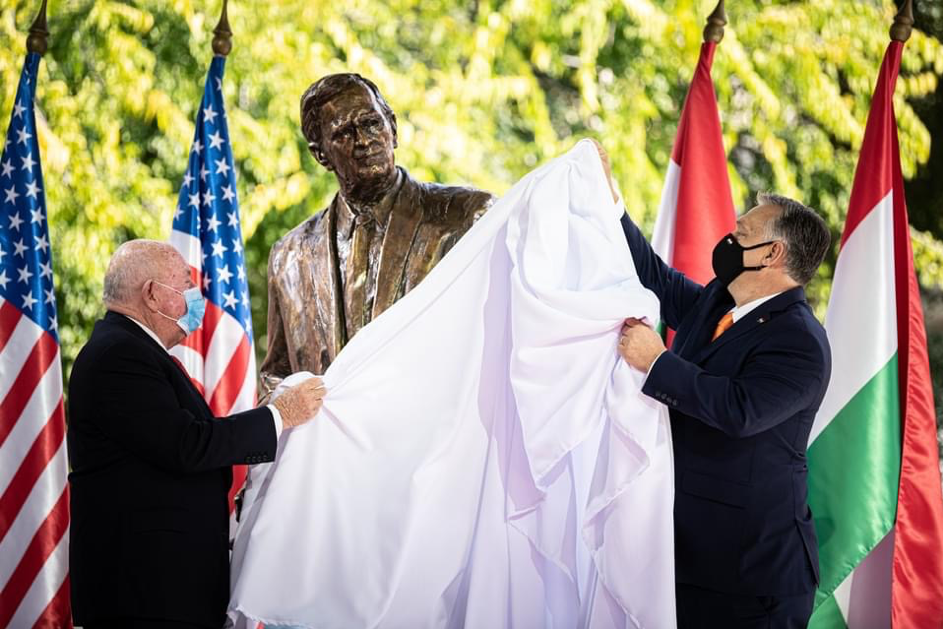
The Hungarian Government unveiled the statue of George Herbert Walker Bush, the 41st President of the United States, on Tuesday in Budapest’s Freedom (Szabadság) Square.
“Hungarians have always regarded the United States a home of freedom,” Prime Minister Viktor Orbán said at the inauguration of a statue.
During George H. W. Bush's long career and as president and vice president, He gained recognition for helping to end the Cold War and aiding democracies in central and eastern Europe.
The statue was unveiled 30 years after the fall of the Iron Curtain, the reunification of Germany and Europe, when freedom and democracy “triumphed” in Central and Eastern Europe, and when “the Hungarian people ended the dark era of communism and embarked on the path of freedom.”
The Prime Minister said President Bush had expressed support for the democratic youth’s request “to free Hungary from Yalta” since the freedom and independence of central Europe had also been the president’s dream.
David B. Cornstein - the outgoing US ambassador – added, the statue is a symbol of the US-Hungarian relationship and optimism for the future. Mr. Cornstein said President Bush had dedicated his life to address freedom around the world and help to lift people up.
The ceremony was attended by Mr. Gergely Gulyás, Minister of the Prime Minister’s office, representatives of the Bush family and foundation, former New York State governor George Pataki and former US Ambassador April H. Foley.
Outgoing US Ambassador David B. Cornstein received today the Commander’s Cross Star of the Order of Merit of Hungary for his role in strengthening HUN-US diplomatic, economic & trade relations & improving Hungary’s international image.
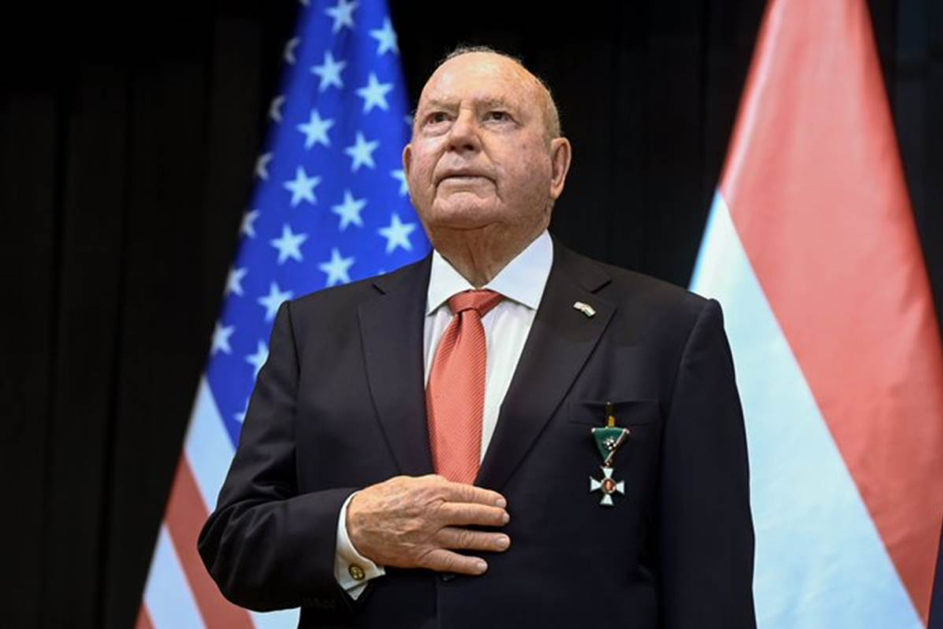
Read more:
dailynewshungary.com/george-bush-monument-inaugrated-in-budapest-photos/
http://www.miniszterelnok.hu/minden-magyar-tudja-amerika-a-szabadsag-foldje/ (HUN)
Orbán Viktor beszéde George Herbert Walker Bush, az Egyesült Államok 41. elnöke budapesti szobrának avatásán (HUN)
http://www.miniszterelnok.hu/orban-viktor-beszede-george-herbert-walker-bush-az-egyesult-allamok-41-elnoke-budapesti-szobranak-avatasan/
Orbán Viktor laudációja David B. Cornstein, az Egyesült Államok magyarországi nagykövetének kitüntetésekor (HUN)
Official photo gallery:
https://kormany.hu/miniszterelnok/fotogaleriak/orban-viktor-george-h-w-bush-szobranak-avatasan
Balassi scholarship 2021
The Ministry of Foreign Affairs and Trade announces that the application in the academic year of 2021 for the Hungarian Language and Cultural Studies Program is now open. Deadline for applications: December 3, 2020. For more information click HERE.
INVITATION TO WEBINAR: Nexus of Humanitarian Aid and Persecution
The Government of Hungary and International Christian Concern present the „Nexus of Humanitarian Aid and Persecution” webinar on November 16, 9.00-10.30am EST. The event will explore the complexities of the nexus between international religious freedom, and the implementation of humanitarian aid and will introduce successful Hungarian case studies.
Click HERE for the program of the webinar. Find more information HERE. Registration: https://zoom.us/webinar/register/WN_y2ChhCwHQKGht_avpEpi6A
Invitation: Budapest Energy Summit on December 1, 2020.
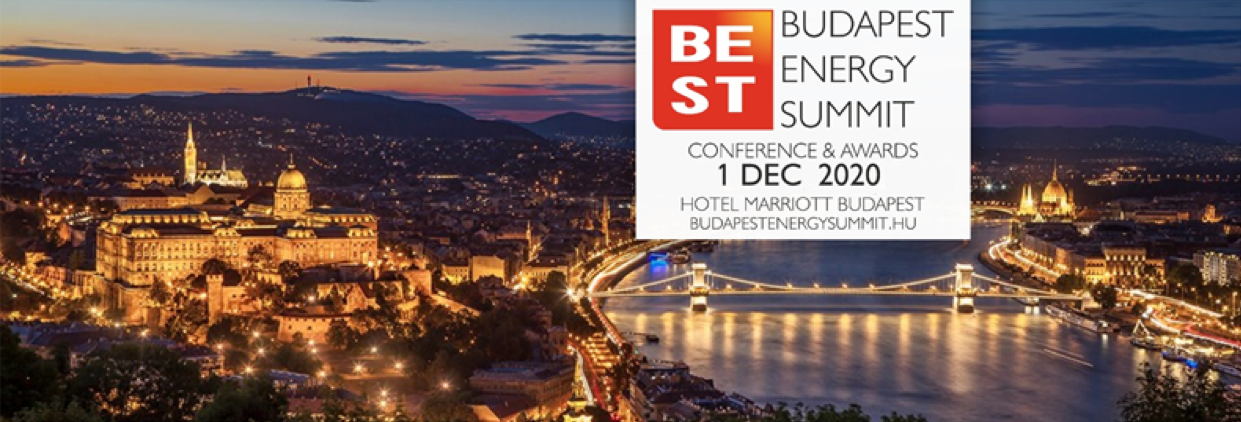
This year the Budapest Energy Summit (BEST 2020) goes virtual on December 1, 2020. The leading regional energy conference creates a unique one-stop-shop for all interested in the policy and economic developments of the energy industry in Central and Eastern Europe, together with their Transatlantic dimension. Aimed to provide a comprehensive picture of the state of the energy sector in light of the pandemic and the climate emergency, the full-day conference will cover recent trends and future plans in energy diversification, decarbonization, energy transition, clean power production, and energy storage in the region.
Speakers include Hungarian foreign affairs and energy industry leaders, European Union leaders, and a diverse group of industry top executives active in the region, such as ExxonMobil, Tellurian, and Gazprom. World-renowned experts, such as chairman of the CERAWeek Energy Conference Daniel Yergin of IHS Markit; László Varró, Chief Economist, IEA; and Kevin Book, Managing Director, ClearView Energy Partners LLC contextualize the discussions that will also cover regional pipeline projects, such as the Krk LNG terminal pipeline, Turkstream, and plans to bring natural gas from the Black Sea offshore fields. Deputy Assistant Secretary Kurt Donnelly will offer the U.S. policy perspective.
The Conference follows several milestones in Hungary’s energy diversification efforts. With the long-term capacity bookings of MVM Hungarian Electricity Works Zrt.’s and another Hungarian company, MET, Hungary has become the long-term principal user of the Krk LNG terminal. Hungary also entered a six-year purchase contract with Shell between 2021 and 2027. This is the first long-term LNG purchase agreement with a Western energy company in Hungary’s history. Starting from next year, almost one-sixth of Hungary’s natural gas imports will arrive through the Krk LNG terminal. Hungary supports further regional diversification projects to ensure that natural gas arrives in the country from as many sources and routes as possible.
Please visit https://budapestenergysummit.hu/ to buy your virtual pass of the conference and remain up-to-date on CEE energy developments and trends by visiting the Newsroom or signing up for the Conference’s newsletter.
The Embassy of Hungary celebrates Day of Hungarian Sign Language
Last week, we celebrated 'Hungarian Sign Language Day' to recognize the language, which keeps us connected to our deaf communities. Our embassy is honored to work with Hungarian companies in the United States, such as SignAll, who are currently testing some of their innovations in the Embassy of Hungary's Business Promotion & Development Campus. SignAll is known for its award-winning sign language translation technology, which can recognize and translate sign language for business and education. SignAll’s Learn Lab is a one-of-a-kind interactive system that provides immediate response to users’ signing to automate learning and practice. Signall Chat is the first and only system for automated translation between American Sign Language and English. Find out more here: https://www.signall.us/
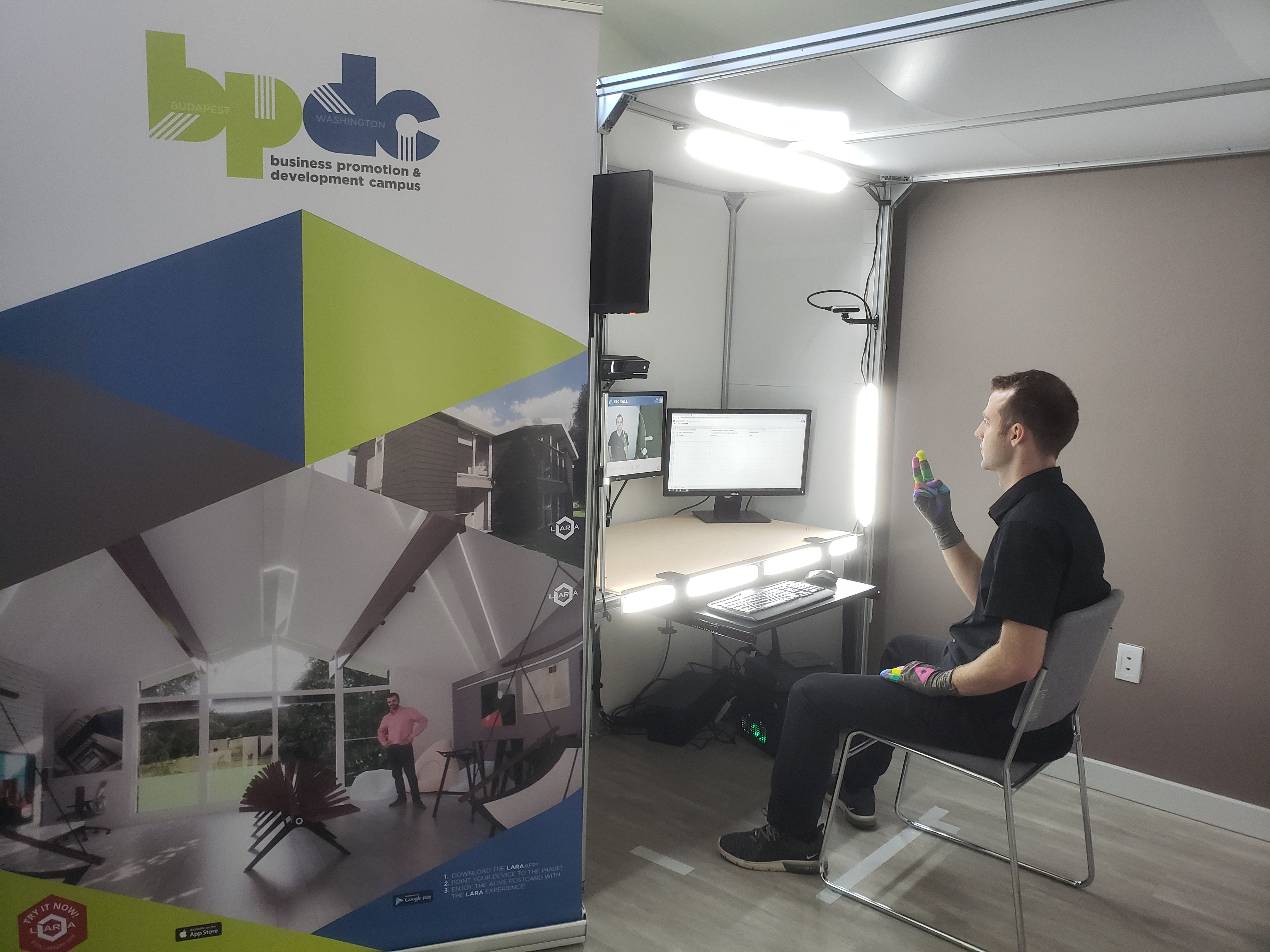
This year also marked the 30th anniversary of the Americans with Disabilities Act of 1990, which was passed to prohibit discrimination based on disability in the United States. But 2020 marked a significant step forward in Hungary as well since earlier this year, members of the Hungarian parliament voted unanimously to adopt changes to the law which regulated the treatment of deaf people, providing the exclusive right for Hungarians to take their state exams in Hungarian Sign Language (HSL), which discursively puts the language in line with spoken languages. Additionally, both deaf and hearing Hungarians may now take HSL in partial fulfillment of a Master’s degree requirements. This was an important and long-awaited step in the acceptance and de-stigmatization of the hearing impaired and sign language in Hungary.
Official notice on the hours of operation during Thanksgiving (Thursday, November 25, 2021)
We would like to inform our Consular Clients that on Thanksgiving Day, November 25, the Consular Office of the Embassy of Hungary will be closed. Thank you for your understanding, and we wish you all a happy Thanksgiving!
BPDC is up and running virtually
More Hungarian companies are expanding internationally. On November 13, 2020, as part of the Business Promotion & Development Campus (BPDC) program, the Embassy of Hungary in Washington DC organized a personalized virtual mentoring day to promote the U.S. market expansion of Hungarian tech firms. On November 17, this event was followed up by a professional workshop for the innovative businesses – Blackbelt, Quadron, Cydrill - who had all previously participated in the embassy’s fall 2019 BPDC program.
On the first day of the program, the companies were given the opportunity to jointly participate in a training on U.S. legal, sales, and taxation issues. Then, separately, the representatives of the companies had the chance to present their products and services to the invited American experts, with whom they were able to discuss in detail various business development opportunities and market entry strategies. On the second day of the program, the three innovative companies met with the Maryland Department of Commerce and the Montgomery County Economic Development Corporation to discuss economic and market opportunities in the DC-Maryland region.
Hungary becomes Core Sponsor of the Three Seas Initiative Investment Fund
Based on Hungary’s political commitment made in March, the Hungarian EXIM Bank concluded its agreement with the Three Seas Initiative (3SI) Investment Fund on December 2, 2020, with an investment of 24.2 M USD. Hungary commends other European core sponsors, namely Poland, Romania, Estonia, Latvia, and Slovenia, for their investments in the Fund, bringing the value of total assets well over 1 BN USD. Hungary also applauds the U.S. Congress for its bipartisan support (https://kaptur.house.gov/sites/kaptur.house.gov/files/documents/BILLS-116hres672-SUS.pdf) of the initiative as well as the decision of the U.S. Administration to invest up to 1 BNUSD in the Fund.
As the initiative (https://www.3seas.eu/) enters into its operative phase with the first project grants awarded, Hungary looks forward to working with all stakeholders, including in the United States, to make the project a transatlantic success story. As another contribution, Hungary offers to host the 3SI permanent Secretariat in Budapest.
US-Hungarian Bridge to Innovation, another momentous virtual BPDC event
Building and improving relationships in the business between the United States and Hungary is a primary goal of the Embassy of Hungary. We are not only working on attracting foreign investments into our wonderful country but also actively working with our domestic companies to help them expand and invest in foreign markets. These were some of the main points addressed by H.E. Ambassador Szabolcs Takács during Thursday’s virtual BPDC event, US-Hungarian Bridge to Innovation. The event provided two Hungarian leaders in IT services, Blackbelt and Quadron, to present their products and business models in front of an expert audience. The duo of Hungarian companies has been working with our partners to identify market opportunities and steps to expanding further into the US markets. A big thank you to the teams at GetGlobal and Innomine for helping organize this event.
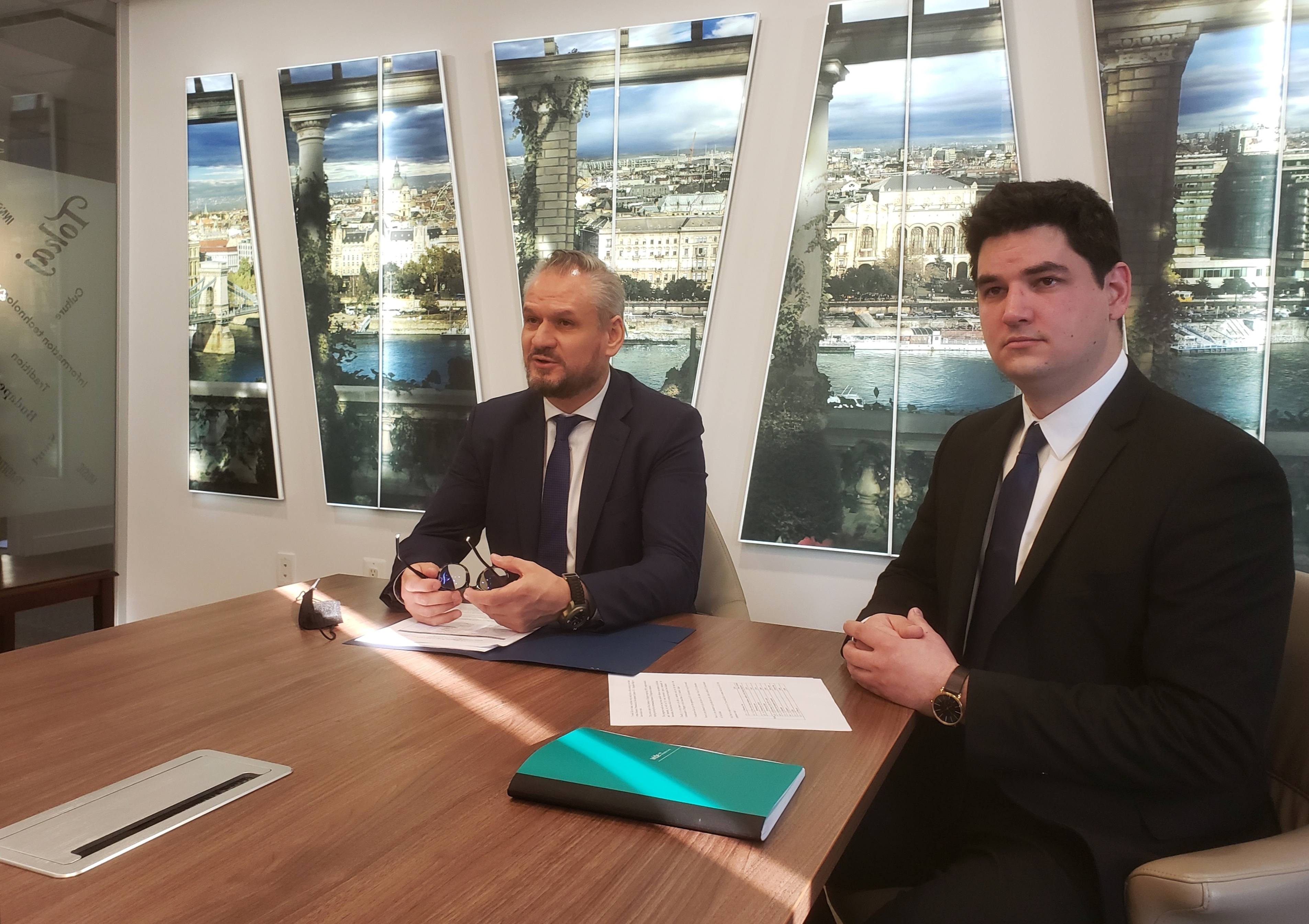
AFI’s The Best in European Cinema goes virtual, December 2-20, 2020

Now in its 33rd year, the AFI European Union Film Showcase continues its tradition of bringing the best in European cinema to our audiences. This year’s Showcase is presented online for the first time; all films are available to viewers in the AFI Silver’s home region of Maryland, Virginia, and Washington, DC, and 29 films are available to view throughout the United States and U.S. Territories.
This year's Showcase features 48 films representing 25 EU member states, including award winners, regional box-office hits, debut works by up-and-coming talents and new works by leading auteurs, plus nine of the top contenders for this year's Academy Award® for Best International Feature Film and 12 U.S. and North American premieres.
2020’s Hungarian title is Lili Horvát’s Oscar-nominated PREPARATIONS TO BE TOGETHER FOR AN UNKNOWN PERIOD OF TIME (FELKÉSZÜLÉS MEGHATÁROZATLAN IDEIG TARTÓ EGYÜTTLÉTRE). The movie will be available between December 13, 9:00 AM and December 20, 11:45 PM, 2020, to viewers located anywhere in Maryland, Virginia, and Washington, DC. Click here for more info on the film:
https://afieu.eventive.org/films/preparations-to-be-together-for-an-unknown-period-of-time-5fa5c4f91104c5004e53e9ef
New this year: VOTE for the AFI European Union Film Showcase Audience Award! All titles in this year’s Showcase – including PREPARATIONS TO BE TOGETHER FOR AN UNKNOWN PERIOD OF TIME - are eligible for the Audience Award. You can only cast your ballot for a film after viewing. One vote allowed per purchaser per film. Look for the winner to be announced on Sunday, December 20! For more information and schedule, please visit the festival’s website: https://afieu.eventive.org/welcome
